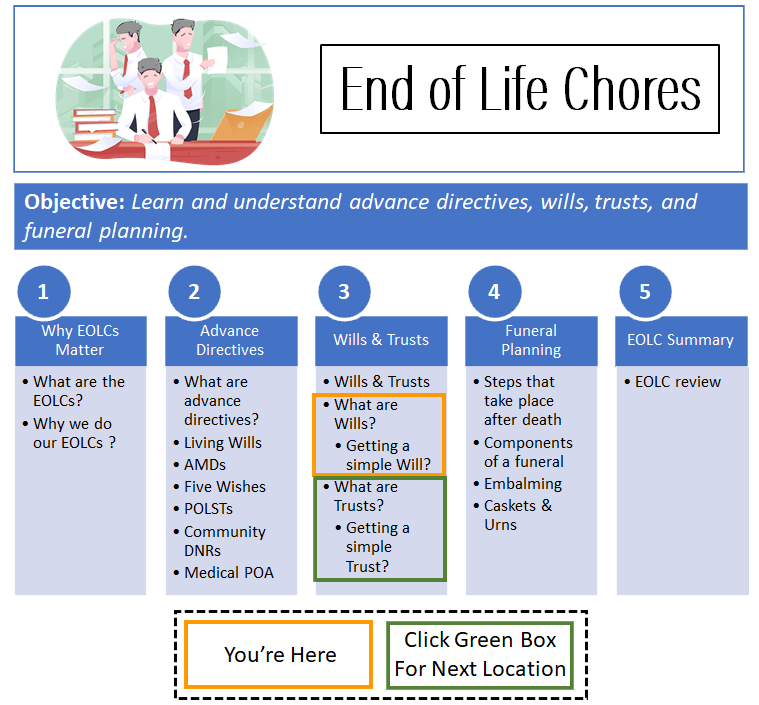Wills
Click here to see what's on this page.
Wills and testaments are legal documents. They are used so a person, upon their dearth, can direct how their possessions are disbursed. The deceased is known as the testator. The testator will name someone to manage the disbursement called the executor. The executor manages the estate until its final distribution.

Courts have generally been purposefully lax in a Will’s requirements. It’s your will after all. Most courts accept a will written in the testator’s own hand. This is called a holographic will.
Making A Simple Will
It’s always best to follow the will laws in your state. However, if your estate is small, making an effort to write your own will, in your own hand, dated, signed, rejecting all prior wills, and getting it witnessed by two uninterested people (not beneficiaries or related to beneficiaries of your will) and notarized usually passes any States Will test.
When To Hire A Lawyer For A Will
There are situations when a simple will not address what you want. Situations where you or any spouse you’ve had has been married more than once, and you or your spouse may have shared assets. These shared assets may not be easily bequeathed by a simple will. These and other situations really require a lawyer. They can analyze the situation and draft documents to meet your objectives.
CarePlanIt does not give legal advice. We are a publisher and provide information. Will and Trusts should always be created and reviewed by lawyers to ensure they adhere to State laws. Lawyers can also help advise on the tax consequences of using different techniques to pass assets from the deceased to beneficiaries. Lawyers can also advise on how various assets prior to death are evaluated if seniors seek government support for aging, especially Medicaid benefits.
What Is Required In A Will
- Legal age
- Sound mind. Looking for testamentary capacity
- Clear evidence of disposition of property and the will to do so
- Voluntarily made and signed
- Written and witnessed (there a few exceptions)
- Follows standard (states have standards and following these increases the the will validity)
- Properly executes
How To Get A Will
The best recommendation we can give you is to use a lawyer in your state to assist you in creating a will. State laws differ and estates of any substance (especially those over $100,000) have tax and other consequences that estate lawyers in your state can help you address.
There are lots of ways to minimize costs of wills. Our online world allows lawyers to work in groups, insurance companies to hire groups of lawyers, and companies to hire lawyers for specific services. The result is a variety of online services including do-it-yourself document creation, technology-mediated document creation, lawyer reviewed technology created documents, lawyer created documents, and combinations of these.
Do It Yourself & Low Cost Will Options
Sometimes you can get away with a very simple Will. If your situation resembles the characteristic below, you might consider a do it yourself approach.
* There is a document called a Small Estate Affidavit designed to allow small estates, under $150,000 (differs by state, and set as low as $50,000 in some) to avoid probate.
If you’re on a budget or trying to save money, there are a couple of go-to options. They include some of the following.
Online Legal Services
These services allow you to select specific products and services and create inline, or create online and consult with a lawyer
DIY Books and Software
Nolo also appears to have licensed the Quicken name and writes and maintains Quicken WillMaker & Trust in software and book formats
Prepaid Legal Services
*American Bar Association affiliated services
**Part of online legal services
***Owned by major insurance company
****Long lasting prepaid legal service
Simple Wills – DIY
There are situations when a DIY approach makes sense.
Every State has a Bar Association, the organization that licenses and manages lawyers. They are a great resource for legal help. Visit their site. Use their search engine to type in “will” and “statutory will.” They will generally return articles or forms that you can use to create a simple will.
Some States have “fill in the blanks” statutory Will Forms. Using Google, or another search engine, type in the [State] and the term “statutory will.” You can find California’s will forms in this manner.
Examples:
